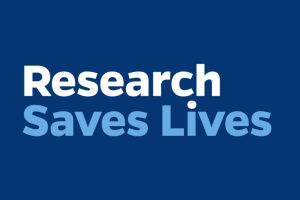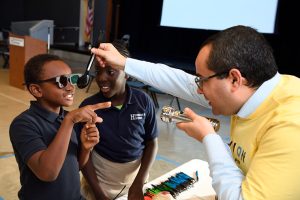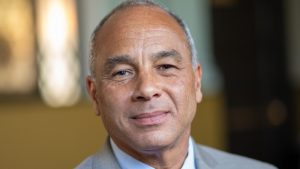

Driving evidence-based change in our schools and communities
PARTNERSHIP AND INNOVATION IN RESEARCH AND PRACTICE
"It's more important than ever to share our expertise and to hear yours, because no institution or community, no school or family can solve these challenges alone."
Evidence-Based Research
Strategic Plan

EXPLORE OUR VIBRANT AND INCLUSIVE COMMUNITIES
Our Campus Community
Johns Hopkins University enrolls more than 31,000 full and part-time students throughout nine academic divisions. At the Johns Hopkins School of Education, you’ll join education colleagues in a close-knit, supportive graduate school environment on the sprawling and picturesque 140-acre Homewood campus. The Education Building is nestled at the southern edge of campus, along the dynamic corridor of North Charles Street.
The City of Baltimore
Strategically situated in the midst of the mid-Atlantic region, Baltimore is more than just our hometown — it’s an extension of our campus, offering world-class entertainment, cultural diversity, and boundless opportunity. Partnerships with school districts, nonprofits, corporations, community organizations, and other Johns Hopkins divisions are an important part of the unique working and learning opportunities we offer.
The Nation’s Capital
Just blocks from the U.S. Capitol Building, Johns Hopkins’ premier research, education, and public engagement facility provides an anchor for advancing knowledge and a physical nexus in the heart of our nation's capital. Boasting modern classrooms, cutting-edge multimedia studios, inviting study lounges, and a library, our new Washington, D.C. home offers a sanctuary for students and faculty.
A Powerful Global Network
At the Johns Hopkins School of Education, we strive to effect change at the local, national, and international levels. Hailing from more than 40 countries, our graduates become important members of a 24,000+ global alumni network that is actively engaged in shaping student outcomes and influencing education policies around the world.

EXPLORE OUR VIBRANT AND INCLUSIVE COMMUNITIES
Our Campus Community
Johns Hopkins University enrolls more than 31,000 full and part-time students throughout nine academic divisions. At the Johns Hopkins School of Education, you’ll join education colleagues in a close-knit, supportive graduate school environment on the sprawling and picturesque 140-acre Homewood campus. The Education Building is nestled at the southern edge of campus, along the dynamic corridor of North Charles Street.
The City of Baltimore
Strategically situated in the midst of the mid-Atlantic region, Baltimore is more than just our hometown — it’s an extension of our campus, offering world-class entertainment, cultural diversity, and boundless opportunity. Partnerships with school districts, nonprofits, corporations, community organizations, and other Johns Hopkins divisions are an important part of the unique working and learning opportunities we offer.
The Nation’s Capital
Just blocks from the U.S. Capitol Building, Johns Hopkins’ premier research, education, and public engagement facility provides an anchor for advancing knowledge and a physical nexus in the heart of our nation's capital. Boasting modern classrooms, cutting-edge multimedia studios, inviting study lounges, and a library, our new Washington, D.C. home offers a sanctuary for students and faculty.
A Powerful Global Network
At the Johns Hopkins School of Education, we strive to effect change at the local, national, and international levels. Hailing from more than 40 countries, our graduates become important members of a 24,000+ global alumni network that is actively engaged in shaping student outcomes and influencing education policies around the world.

Find a Program
Discover the Degree or Certificate Program That’s Right for You
Programs Matching Counselor
Programs Matching Health Professional
Programs Matching Learning Design Specialist
Programs Matching Pre-K-12 Teacher
Programs Matching Research or Policy Expert
Programs Matching School Leader
IMPORTANT QUESTIONS AND ANSWERS
What are post-master’s certificates in education?

Post-master's certificates are short-term academic programs designed to enhance knowledge and skills.
Post-master's certificates in education are designed for students who already hold a master's degree and seek further specialization or additional credentials in the field of education.
What is the difference between a PhD and an EdD?

A Doctor of Philosophy (PhD) in education centers on theory and academic research while a Doctor of Education (EdD) emphasizes practice and applied research.
At the Johns Hopkins School of Education, the PhD in education is a well-respected academic degree that focuses on the conduct of research, creating new knowledge vital for educational policies and practice. The EdD is a sought-after professional degree that focuses on the application of existing research to drive innovation and address practical issues in diverse educational settings.
What kinds of degrees are offered by graduate schools?

Graduate schools typically offer higher education programs beyond the undergraduate level.
At the Johns Hopkins School of Education, our graduate programs include doctoral programs, master’s programs, and certificate programs. Your choice of program depends on your career goals and your preferences as far as location, the format of your classes, and whether you want to attend part-time or full-time.
What is an MS in education?

An MS (Master of Science) in education is a graduate degree that focuses on advanced study and research in education.
Designed to equip educators, administrators, and community advocates with advanced knowledge and skills, the MS in education programs from the Johns Hopkins School of Education offer opportunities to study topics ranging from educational technology and STEM education to education policy and global leadership.
How do you get a job in education policy?

Pursuing a relevant degree program and gaining practical experience are some steps toward getting a job in education policy.
To work toward a career in education policy, along with pursuing a relevant degree in education policy, you can gain valuable experience through internships or research positions at education-focused organizations or government agencies. Also, network with professionals in the field and stay updated on current education policy issues to enhance your chances of securing a job.
How do you get a job in early childhood education?
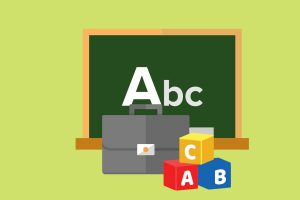
To get a job in early childhood education, you typically need experience and certifications.
Along with obtaining your degree in education, you can gain practical experience through internships or student teaching, and pursue any required certifications or licenses that are specific to your region or position. Networking, attending job fairs, and researching local early childhood education centers can also help in finding job opportunities.
What jobs can you get with an education degree?
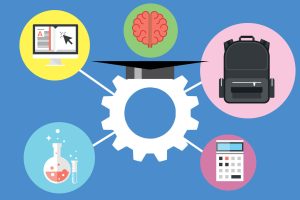
You can pursue various career paths with an education degree.
At the Johns Hopkins School of Education, our graduates typically pursue diverse career paths including classroom teaching in K-12 schools, curriculum development, instructional design, educational administration, educational consulting, school counseling, educational research, instructional coaching, adult education, higher education administration, as well as positions in education policy and advocacy.
What comes after a master’s degree in education?

After completing a master's degree in education, you have several options to further your education and advance your career.
After a master’s degree, you can choose to pursue a doctoral degree, such as a Doctor of Philosophy (PhD) in education or a Doctor of Education (EdD), or pursue specialized certifications or graduate certificates in specific areas of education to enhance your expertise and career prospects.
What is rolling admission and how long does it take?

Rolling admission refers to when an institution accepts and reviews applications as they are received.
Rolling admission is an application process where the institution accepts and reviews applications as they are received, rather than within a specific application period. The processing time for rolling admission can vary, but typically applicants receive a decision within a few weeks to a couple of months after submitting their completed application.
Do you need a master’s degree to get a PhD in education?

A master's degree is not always a requirement for admission into a PhD program in education.
In many cases, a master's degree is not a strict requirement for admission into a PhD program in education. However, specific requirements vary among institutions. At the Johns Hopkins School of Education, we require a bachelor’s and master’s degree from a regionally accredited college/university, or an equivalent credential earned from a qualifying international institution.
How long does it take to get a PhD in education?

The duration of a PhD in education depends on a few factors.
The time required to complete a PhD program can vary depending on factors such as the program structure, research focus, and individual progress. On average, it takes around 4 to 6 years of full-time study beyond a master's degree to earn a PhD in education.
How long is a master’s degree in education?

The duration of a master’s degree in education depends on a few factors.
The duration of a master's degree can vary depending on factors such as the program structure, full-time or part-time enrollment, and any prerequisites you may have to complete as part of the program. On average, a master's degree in education can be completed in approximately 1 to 2 years of full-time study.
How much is a PhD in education?

The cost of a PhD in education depends on a few factors.
At the Johns Hopkins School of Education, PhD students are eligible for a fellowship for up to four years. The fellowship includes a yearly stipend and health insurance, and will cover tuition and fees. Additionally, Johns Hopkins PhD students can apply to receive a $1,500 need-based grant to offset the costs of relocating.
What is a matriculation fee?

A matriculation fee is a one-time payment required by educational institutions upon enrollment.
Matriculation fees cover administrative costs related to creating student records and processing paperwork. Tuition fees, in contrast, are typically recurring payments that cover the cost of instruction and educational services provided throughout the duration of an academic program.
What is tax-free employer-provided assistance?

Tax-free employer-provided assistance is financial assistance offered by employers to their employees as a benefit.
Tax-free employer-provided assistance programs can help subsidize the cost of education, and promote continuous learning and professional development. Under certain conditions, the funds provided by the employer for education-related expenses, such as tuition, books, or supplies, may be excluded from the employee's taxable income, reducing their tax liability.
How much does a master’s degree in education cost?

The cost of a master's degree in education depends on a few factors.
The total cost of a master's degree can vary significantly depending on factors such as the institution, program duration, location, and whether your classes are online or on campus. On average, tuition for a master's in education ranges from $10,000 to $50,000, or more. At the Johns Hopkins School of Education, resources for financial aid, loans, scholarships, and other sources of funding are available to help you navigate your finances.
